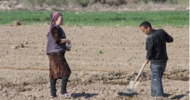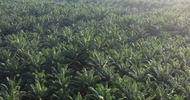The two months we spent in the Amhara and Oromia regions of Ethiopia, surveying smallholders and profiling large-scale commercial farms, left us with a different impression.
- The New Security Beat
-
06 October 2010
The EAC food security strategy advises partner states to “resist leasing or selling large chunks of land to foreign entities for food production or bio-fuels solely for export.”
- East African
-
04 October 2010
Contract is for 10,000 ha in the Regional State of Gambela for a period of 25 years, with option for renewal.
The people of Ethiopia have a question for you and the government of Ethiopia you represent, “Why are you giving away our land to foreigners?”
- Anyuak Media
-
30 September 2010
India's Karuturi plans to emerge as a leading player in agriculture in the African continent, with revenues from agriculture trumping revenues from floriculture in two years.
- Business Standard
-
24 September 2010
Wary of fluctuations on Wall Street, more wealthy Americans, private funds and foreigners are putting money into parcels of cornfields, fruit orchards and other US agricultural products.
- LA Times
-
19 September 2010
Punjab-based farmers are set to acquire 50,000 ha of farm land on lease in Ethiopia for growing high-value cash crops, including pulses and maize, for export to India and Europe.
Tensions against Indian companies acquiring farmland in Ethiopia are mounting, according to Tehelka
- Tehelka
-
17 September 2010
The International Financial Corporation has actually increased the ability of foreign investors to acquire land in developing country markets by promoting profitable deals, creating “investment promotion agencies” and rewriting national laws., says Anuradha Mittal
There is too much at stake when governments give up land, water, and livestock to large-scale foreign investment. NGOs and funders have to listen and respond to the needs and accomplishments on the ground, and keep local food systems truly local.
- Christian Science Monitor
-
14 September 2010
Anywaa Survival Organisation would like to call upon indigenous people to resist this kind of land grabbing effort of the Ethiopian government, now acknowledged by a World Bank report
Hassad Food knows how to shop. The $1b subsidiary of Qatar’s sovereign wealth fund finalised a $500m agreement last year to grow wheat & rice on 100,000 ha in Sudan and has announced plans to invest $700m worldwide this year.
- The National
-
02 September 2010
Studies suggest that a third of the land sold or acquired in Africa is intended for fuel crops - some 5 million hectares. Friends of the Earth has looked at cases of land grabbing in 11 countries across Africa, from Ethiopia to Mozambique
UNCTAD believes pension funds, with their apparent focus on reputation, accountability, and the long term, could set new best-practice standards as they join the farmland investment trend.
- Guardian News and Media
-
27 August 2010
Gambela’s new tag as a land grabbing hub comes as BHO Agro Plc becomes the third Indian firm to begin operations in the region after two other Indian companies, Karuturi and Ruchi Group, moved into Gambela in 2008 and early 2010, respectively.
- Afrik News
-
26 August 2010
Since the food crisis of 2008, food justice activists have warned that governments in concert with multinational corporations have accelerated a worldwide "land grab" to buy up vast swaths of arable land in poor countries.
- Democracy Now!
-
24 August 2010
New study urges Kingdom to forge strategic alliances with global food giants to facilitate access to land or to final products.
- Emirates 24/7
-
23 August 2010
Africa, where one in three people is malnourished, is now growing tomatoes and butter lettuce for export.
It is not too late for equitable partnerships to flourish between foreign investors and local communities.
Study reveals that over 50 million hectares are currently assigned in land deals or under negotiation in 27 African host countries – an area equivalent to France.
- Global Land Project
-
14 August 2010
A four-part piece about the increasing prevalence of large-scale land acquisition or "land grabs" in Sub-Saharan Africa from the Worldwatch Intitute.
- Huffington Post
-
05 August 2010
To speak only of the ‘threats and potential opportunities’ that these investments highlight leaves underexposed the grave risks to human rights that they pose, writes Dr. Margot Salomon, from the London School of Economics
- Al Majalla
-
04 August 2010
Hedge funds and bankers are buying everything from farmland to mines across the Global South. Mark L Thomas looks at how speculators here fuel exploitation half a world away
- Socialist Worker
-
27 July 2010
Investors in farmland are targeting countries with weak laws, buying arable land on the cheap and failing to deliver on promises of jobs and investments, according to the draft of a report by the World Bank.
- Financial Times
-
27 July 2010
As the world's available farming land shrinks in the face of population growth, climate change and soil degradation, Australia's vast tracts of land are going to be increasingly important for global food security. Is the sell-off in Australia's long term interests?
Foreign interests including state-owned companies from China and the Middle East are increasingly looking to Australia to secure their food production by purchasing key agricultural assets.
Africa's untapped agriculture potential make it an ideal partner for resource-constrained Middle Eastern countries that seek to improve their food security, a new report from Standard Chartered Bank said.
- Trade Arabia
-
22 July 2010
Indian floriculture companies are moving into other agri-products in the world's second-largest continent.
- Business Today
-
21 July 2010
Growing world food insecurity is ushering in a new geopolitics of food scarcity, one where competition for land and water is crossing national boundaries.
Jagjit Singh Hara, a farmer in Jalandhar, has been getting offers from Congo, Namibia and Nigeria to take land on lease and start cultivation.
- Financial Express
-
12 July 2010















